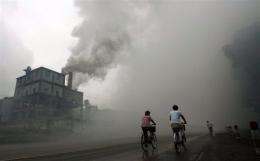Climate talks ending with rich-poor rift wide open

Two weeks of crucial UN climate talks were due to conclude Friday after exposing huge rifts between rich and poor nations, just weeks ahead of the deadline for sealing a planet-saving global deal.
Only five negotiating days remain, in November, before 192 nations converge for a critical December showdown in Copenhagen, where they have pledged to conclude a treaty to tackle global warming.
Without rapid action, scientists say, the world faces catastrophe in the form of drought, flooding, famine and forced migration.
"My feeling is that the ball, immediately, is in the developed country court to make it clearer what they are looking for," said Malta's Michael Cutajar, co-chair of the UN Framework Convention on Climate Change (UNFCCC) talks.
A few minutes later at a separate press conference, US negotiator Jonathan Pershing countered, "I think the ball is in the court of all countries".
He highlighted a key demand from rich countries that emerging giants such as China, India and Brazil commit to binding actions on climate.
"We are at a critical stage with major issues unresolved," said Martin Khor, executive director of the South Centre, a Geneva-based think-tank aligned with developing world positions.
"If there is no improvement in the divisions, the prospects are certainly not bright for an outcome in Copenhagen that is ambitious environmentally, and equitable from a social point of view," he said.
The key stumbling blocks are how to share out the job of slashing the heat-trapping greenhouse gases, and how much money wealthy nations will cough up to help developing ones fight climate change and cope with its impacts.
"At the end of the day, if you don't have ambitious (emissions) targets from rich nations, and if you don't have significant finance on the table, the whole thing falls apart," said Yvo de Boer, the UN's top climate official.
But even as Bangkok inched from procedure to substance, negotiators on both sides of the issues agreed the expert-level dialogue will remain blocked without strong input from world leaders between now and December.
"This is not the only game in town," said de Boer, referring to the UNFCCC, of which he is Executive Secretary.
Expectations are high for a second world leaders' summit on climate before Copenhagen, following a September gathering at the UN in New York, but no dates have been announced.
The looming question of how the United States will fit into any new agreement has dominated the Bangkok meeting, with Pershing making clear that Washington will never join the Kyoto Protocol.
Kyoto legally binds 37 industrialised countries to cut greenhouse gas output by a total of more than five percent before 2012 compared to 1990 levels.
This forces the issue of whether to scrap Kyoto and fold some of its provisions into a new accord, or to expand its provisions for another five or seven years while cutting a separate deal for the US.
"A single instrument is more coherent, and for that reason is preferable," said Elliot Diringer, Vice President of the Washington-based Pew Center on Global Climate Change.
But developing nations -- especially India and China -- expressed deep alarm in Bangkok at what they saw as a shift away from Kyoto toward a US proposal for a "bottom-up" approach, in which countries submit national plans to outside verification.
"The European Union, which was the most loyal to the Protocol up to now -- seems to be wavering. If they jump ship, Kyoto will be an empty shell," said Khor.
(c) 2009 AFP

















